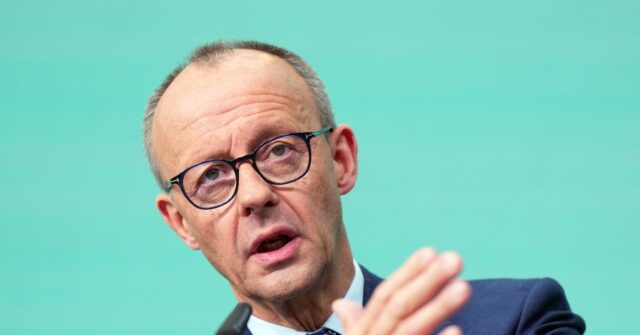


Following his party’s victory in federal elections on Sunday, Friedrich Merz, the likely next Chancellor of Germany, rejected overtures from President Donald Trump while calling for “independence” from the United States and accusing Washington of election interference.
On Sunday, German voters firmly rejected the former leftist governing coalition of Social Democrats and Greens in favour of the supposedly conservative Christian Democrats and the populist-right Alternative for Germany (AfD).
In response to the election results, President Donald Trump commented on his Truth Social platform: “Looks like the conservative party in Germany has won the very big and highly anticipated election. Much like the USA, the people of Germany got tired of the no common sense agenda, especially on energy and immigration, that has prevailed for so many years.”
“This is a great day for Germany, and for the United States of America under the leadership of a gentleman named Donald J. Trump. Congratulations to all — many more victories to follow!!!” Trump added.
However, the successor to Angela Merkel and likely incoming chancellor Friedrich Merz, whose party came first in Sunday’s vote but fell well short of a majority with just 28.5 per cent of the vote, was quick to reject a right-wing alliance with the AfD in favour of a left-wing coalition and to distance himself from Trump and America in general.
“I am communicating closely with a lot of prime ministers and heads of EU states, and for me, it is an absolute priority to strengthen Europe as quickly as possible so that we achieve independence from the U.S., step by step,” Merz said per state broadcaster DW.
“I never thought that I would ever need to say something like that, on television, but after the latest statements made by Donald Trump last week, it is clear, that the Americans — at any case these Americans, this administration — mostly don’t care about the fate of Europe one way or another,” the CDU leader added.
Merz went on to accuse the Trump administration of having committed election interference, likely hinting at key Trump ally Elon Musk, a vocal supporter of the anti-mass migration Alternative for Germany party,
He said that the “interventions from Washington were no less drastic, dramatic, and ultimately no less brazen, than the intervention that we have seen from Moscow.”
The likely incoming chancellor has previously threatened that Musk’s companies may face “political” or “legal” repercussions for his supposed interference during the election campaign. In addition to his X social media platform, Musk’s Tesla firm also has a major “gigafactory” manufacturing plant in Germany.
Merz has also confirmed that he intends to continue Germany’s restrictive speech laws. In response to criticisms over Berlin’s censorship regime from U.S. Vice President JD Vance earlier this month at the Munich Security Conference, Merz said: “Freedom of speech remains freedom of speech, but fake news, hate speech, and crimes are subject to legal restrictions and independent courts.”
Following the strong result for the AfD, which saw its support double over the last election in 2021 to 20.8 per cent on Sunday, Musk predicted: “At this rate of growth, the AfD will be the majority party by the next election.”
The X boss also highlighted the growing base of young voters who backed the anti-mass migration party as a sign of the inevitability of an eventual election win for the AfD.
According to public broadcaster Tagesschau, the AfD was the second-strongest party among 18-24-year-old voters at 21 per cent, only trailing behind the socialist Die Linke (The Left) party at 25 per cent. The AfD led all parties among 25-44-year-olds, however, with one in four (24 per cent) backing the party.
Regardless of voters clearly rejecting the leftist ‘traffic light’ coalition government, Merz has said that he will seek to form a new government with the ousted Social Democrats (SPD) and potentially even the far-left Greens rather than working with the AfD. This is despite apparently aligning more closely with the right-wing party on issues such as the green agenda and migration.
The CDU leader said that he would begin talks with the leftist party on Monday and that he is “very confident” in their ability to form a government in the coming days. However, SPD co-leader Lars Klingbeil downplayed the idea of a quickly formed coalition, saying that it is “not certain” that his party will even be willing to join with the former Merkel party again, indicating that Merz may need to give concessions to the left on key areas of policy such as mass migration, notwithstanding his campaign promise of clamping down on the border.
